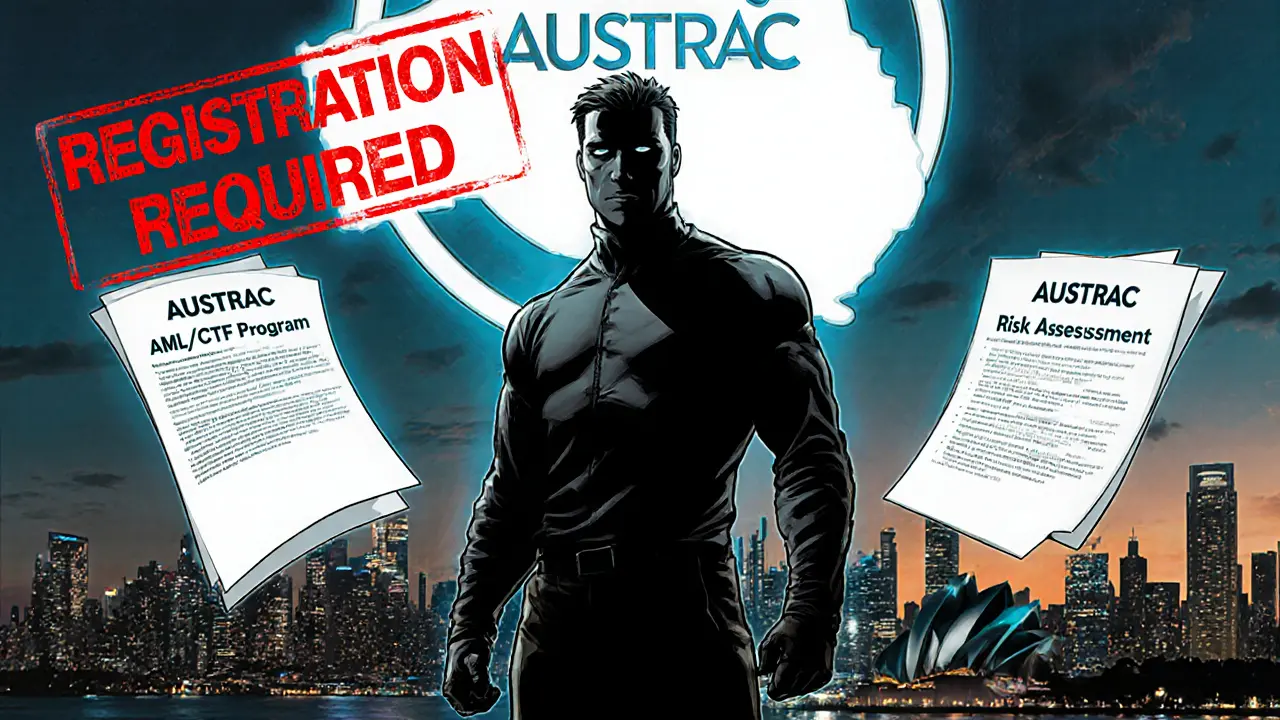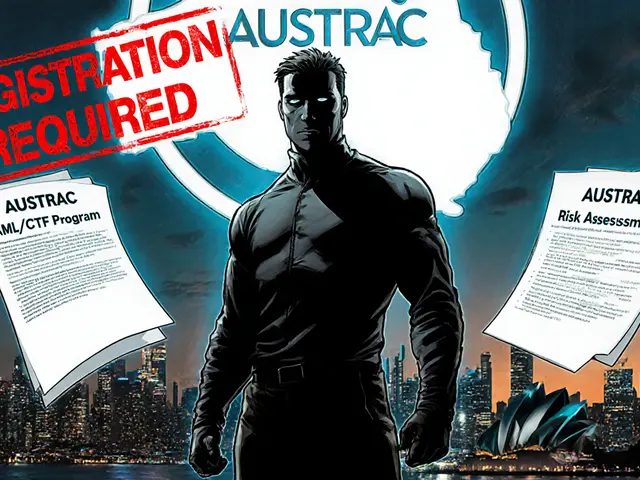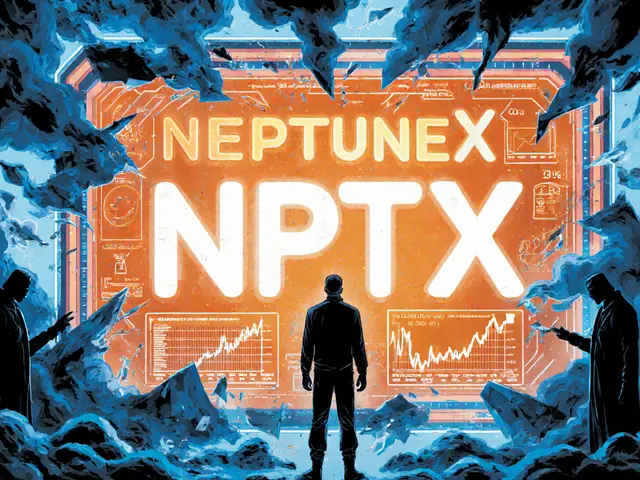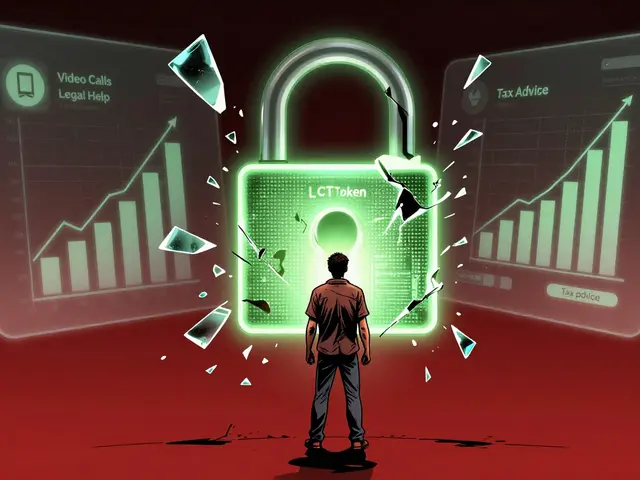AUSTRAC Registration Requirements for Crypto Exchanges in Australia 2025
AUSTRAC Crypto Exchange Registration Eligibility Checker
Determine if your business needs to register with AUSTRAC in Australia based on your specific services. This tool helps you understand whether you must comply with Australia's digital currency exchange regulations.
If you're running a crypto exchange in Australia, you must register with AUSTRAC - and if you haven't, you're breaking the law. There's no gray area. As of October 2025, any business that swaps fiat money for cryptocurrency - or the other way around - needs official approval from AUSTRAC, Australia’s financial intelligence unit. This isn’t optional. It’s not a suggestion. It’s a criminal offense to operate without it.
Who Exactly Needs to Register?
Not every crypto business needs to register. Only those offering digital currency exchange (DCE) services - meaning buying or selling crypto for Australian dollars, or vice versa. That includes online platforms, mobile apps, and even physical crypto ATMs. If your business touches fiat currency and crypto, AUSTRAC wants to know about it.But here’s what’s changing: Starting March 31, 2026, the rules will expand dramatically. Right now, you only need to register if you trade fiat for crypto. After March 2026, you’ll also need registration if you exchange one cryptocurrency for another - like swapping Bitcoin for Ethereum. You’ll need it if you hold crypto for clients (custody), transfer digital assets on someone else’s behalf, or help launch token sales like ICOs. This isn’t a minor update. It’s a full-scale regulatory overhaul to match global standards set by the Financial Action Task Force (FATF).
What You Need Before You Apply
You can’t just fill out a form and hit submit. AUSTRAC requires two core documents before you even start the application:- AML/CTF Program: This is your company’s rulebook for stopping money laundering and terrorist financing. It must detail how you verify customers, monitor transactions, and report suspicious activity. It can’t be a copy-paste template - it needs to reflect your actual operations.
- Money Laundering and Terrorism Financing (ML/TF) Risk Assessment: You must prove you’ve analyzed your business risks. Who are your customers? Where do they come from? What’s the volume of your trades? Are you dealing with high-risk jurisdictions? Your assessment must be specific, current, and realistic.
Many businesses get rejected because they skip these steps. AUSTRAC doesn’t ask for them upfront - but if they review your application and find them missing, they’ll pause everything until you deliver. That can take weeks. Better to have them ready before you apply.
The Registration Process
The application is done online through AUSTRAC’s portal. You’ll need to provide:- Your business details (ABN, legal structure, contact info)
- Names and backgrounds of directors and key personnel
- Your AML/CTF Program and Risk Assessment
- Proof of identity for all owners and senior managers
AUSTRAC also offers a free online tool to help you figure out if you even need to register. If you’re unsure whether your business model counts as a DCE, use it. It’s quick, accurate, and saves you from wasting time on a doomed application.
What Happens After You Apply?
AUSTRAC doesn’t just approve or deny. They have full power to:- Refuse your application outright
- Suspend or cancel your registration
- Refuse to renew it
- Add conditions to your registration - like limiting the types of crypto you can trade or requiring more frequent reporting
- Publicly name your business if you violate rules
There’s no appeals process you can rush through. If AUSTRAC says no, you’ll need to fix the issue and reapply - which could take months. And if you’re caught operating without registration, you could face fines up to $21 million or even jail time for individuals.

What You Must Do After Registration
Getting approved isn’t the end - it’s the beginning. Registered exchanges must keep up with ongoing obligations:- Know Your Customer (KYC): You must verify every customer’s identity before they trade. That means collecting government-issued ID, proof of address, and sometimes even source of funds documentation. No exceptions. No "trust us" moments.
- Transaction Monitoring: Your system must flag unusual activity - like large, rapid transfers, or trades involving sanctioned countries. You’re expected to detect patterns, not just react to red flags.
- Reporting: You must report suspicious transactions within 24 hours. Large cash transactions over $10,000 (or equivalent in crypto) must be reported within 3 business days.
- Record Keeping: Keep all customer data, transaction logs, and internal reports for at least 7 years. Auditors will ask for them. And if you don’t have them, you’re in trouble.
- Annual Compliance Report: Every year, you must submit a report proving you’ve followed your own AML/CTF Program.
These aren’t paperwork exercises. They’re live systems that must run 24/7. Many small exchanges fail because they treat compliance as a one-time task. It’s not. It’s a full-time job.
AUSTRAC vs ASIC: Don’t Confuse Them
Many people think if you’re registered with AUSTRAC, you’re covered. You’re not. AUSTRAC only handles anti-money laundering rules. If your crypto assets qualify as financial products - like tokenized shares, derivatives, or investment tokens - you also need an Australian Financial Services License (AFSL) from ASIC.As of June 2025, most utility tokens (like Ethereum or Solana) don’t require an AFSL. But if you’re selling tokens that promise profit-sharing, dividends, or voting rights, you’re likely offering a financial product. That triggers ASIC’s stricter rules: disclosure documents, capital requirements, and consumer protection obligations.
Some exchanges now operate under both: AUSTRAC for trading fiat and crypto, and ASIC for selling investment tokens. Ignoring ASIC when you need it is just as risky as ignoring AUSTRAC.
Why This Matters Now
Australia’s crypto market exploded after 2020. But the FTX collapse in late 2022 exposed how little protection users had. In 2023, the government launched a "token mapping exercise" to classify every crypto asset by risk. That led to the upcoming March 2026 changes.Right now, Australia’s rules are lighter than those in the EU or U.S. But that’s changing fast. Draft legislation is being reviewed to require all exchanges to hold full financial services licenses - not just AUSTRAC registration. If you’re planning to scale, you need to prepare for that future now.

What Happens If You Don’t Register?
The penalties aren’t just financial. They’re existential.- Fines up to $21 million for companies
- Up to 10 years in prison for individuals
- Bank accounts frozen
- Payment processors cut you off
- Reputation destroyed - customers and partners will walk away
There’s no "grace period." AUSTRAC doesn’t warn you first. If they find you operating without registration, enforcement starts immediately. And once your name is on their public enforcement list, no bank, no payment provider, no investor will touch you.
How to Get It Right
Don’t try to do this alone. The paperwork is complex. The rules change fast. Most successful exchanges hire compliance consultants with experience in AUSTRAC applications. Companies like Zitadelle AG and Xenia Compliance specialize in helping crypto businesses navigate this.Here’s your checklist:
- Use AUSTRAC’s online tool to confirm you need registration
- Build your AML/CTF Program - tailored to your business, not copied from a website
- Complete your ML/TF Risk Assessment - be brutally honest about your exposure
- Gather all staff IDs and business documents
- Apply online - but don’t rush
- Start preparing for March 2026 - add crypto-to-crypto trading and custody to your compliance plan
- Review if you need ASIC’s AFSL too
Waiting until March 2026 to prepare is a mistake. The new rules will hit hard. If you’re not ready, you’ll be forced to shut down - or face legal action.
Consumer Protection Still Applies
Even if you don’t need an AFSL, you still have to follow the Australian Consumer Law. That means no false claims. No misleading ads. No promising guaranteed returns. If your website says "Earn 20% monthly with our crypto staking," you’re breaking the law - regardless of your AUSTRAC status.Transparency isn’t optional. It’s the foundation of trust. And in Australia’s evolving crypto market, trust is the only thing that will keep you in business.
Do I need AUSTRAC registration if I only trade crypto for crypto?
As of November 2025, no - you don’t need to register yet if you only exchange one cryptocurrency for another. But that changes on March 31, 2026. After that date, crypto-to-crypto exchanges will be required to register with AUSTRAC. If you’re planning to offer this service beyond early 2026, start preparing now.
Can I operate a crypto ATM without AUSTRAC registration?
No. Any crypto ATM that lets users buy cryptocurrency with cash or sell crypto for cash is considered a digital currency exchange under AUSTRAC rules. You must register before installing or operating the machine. Failure to do so is a criminal offense.
How long does AUSTRAC registration take?
There’s no fixed timeline. If your application is complete and your documents are strong, it can take 8 to 12 weeks. If AUSTRAC requests more information or finds gaps, it can stretch to 6 months or longer. Many businesses delay for months because they don’t have their AML/CTF Program ready. Start early.
Do I need an Australian business address to register?
Yes. AUSTRAC requires your business to have a physical presence in Australia. You can’t register if you’re offshore and serving Australian customers. Even if your servers are overseas, your legal entity, management, and compliance team must be based in Australia.
What happens if I’m already operating without registration?
Stop immediately. Continuing to operate puts you at risk of criminal charges, fines, and asset freezes. Contact a compliance specialist to assess your situation and begin the registration process. You may be able to apply for registration retroactively, but you’ll need to prove you’ve stopped operations and are now compliant. Don’t wait for AUSTRAC to find you.
Is AUSTRAC registration enough for a crypto business in Australia?
Only if you’re only trading fiat for crypto. If you’re issuing tokens, offering staking with returns, or trading derivatives, you may also need an Australian Financial Services License (AFSL) from ASIC. Many businesses now hold both. Don’t assume AUSTRAC covers everything - check with a legal advisor if your services go beyond simple exchange.








Bro, Australia’s crypto rules are wild but honestly? They’re catching up. In India, we’re still in the ‘let’s see what happens’ phase. Here, if you’re not registered, you’re basically running a casino without a license. Respect the grind though - compliance ain’t sexy, but it keeps the lights on.
austrac? what even is that? i just buy btc with cash and call it a day 😴
Actually, the FATF guidance is clear: any entity facilitating crypto-to-crypto swaps is a VASP as of 2026. Australia’s move is conservative compared to the EU’s MiCA framework, which mandates full licensing for custody and DeFi intermediaries. You’re not just complying with AUSTRAC - you’re aligning with global AML norms. Ignoring this is like running a bank without FDIC oversight.
One must pause to reflect upon the profound regulatory evolution unfolding in the Antipodean financial ecosystem. The confluence of AUSTRAC’s statutory mandate with the emergent taxonomy of digital asset classification represents not merely compliance, but a paradigmatic recalibration of fiduciary responsibility in the post-FTX epoch. One cannot help but admire the granularity of the AML/CTF Program requirements - a veritable jurisprudential tapestry woven with precision.
I’ve been running a small crypto ATM in Phoenix for two years now - cash in, BTC out. Never thought I needed a license until I read this. Now I’m sweating bullets. I didn’t even know AUSTRAC had jurisdiction over U.S.-based machines if they serve Australians. Wait, do they? Do I need to register if I’m just in the U.S. but someone from Sydney uses it? I’m gonna need a lawyer. And maybe a therapist. This is more complicated than my last tax return.
YESSSS!!! 🚀 Compliance is the new crypto hustle. No more shady shit. Time to get legit, build real trust, and stop being the guy who says ‘trust me bro’ with a QR code. This is the future - clean, clear, and legal. Let’s gooooo! 💪🔥
My cousin runs a crypto shop in Sydney. He got flagged last year because he didn’t have the risk assessment done right. Took him 5 months to fix it. AUSTRAC doesn’t mess around. They’ll send you a letter, you panic, then you hire a compliance firm for $15k. Worth it. Better than jail.
For anyone reading this and thinking ‘I’ll just wait till March 2026’ - stop. That’s like waiting until the fire alarm is blaring to check your smoke detector. Start your AML program now. Use the AUSTRAC tool. Talk to a consultant. You’re not behind - you’re already late. And if you’re a small operator, don’t try to DIY this. It’ll break you.
Pathetic. Australia’s rules are still toddler-tier. In Singapore, you need a MAS license, full KYC, cold storage audits, and quarterly penetration tests. Here? You get a form and a prayer. And people wonder why crypto is a joke. This isn’t regulation - it’s a bureaucratic afterthought with teeth. If you’re serious, you’re already operating under MiCA or Dubai’s VASPs. This? This is just noise.
Ugh. Another ‘compliance checklist’ post. I’m tired of this. Everyone’s scared of regulators. Just move to Switzerland or Dubai. Why bother with all this paperwork? It’s 2025 - crypto’s supposed to be free, not a tax audit with blockchain.
Don’t forget: the 7-year record-keeping rule? It applies to EVERYTHING - chat logs, internal emails, even screenshots of customer ID uploads. I’ve seen people get nailed for deleting a Slack thread from 2023. And don’t assume ‘we’re small, they won’t notice’ - AUSTRAC uses AI to scan transaction patterns. They’ll find you. Don’t risk it. Seriously.
ok so i just got my aml program done and wow it’s like writing a novel but with more jargon 😅 also i had no idea crypto atms count?? i thought they were like vending machines??
THIS IS A DISASTER. People think they can ‘just start’ and figure it out later? NO. If you’re running a crypto business and you haven’t started your AML/CTF program, you’re already guilty. AUSTRAC doesn’t care if you’re ‘small’ - they care if you’re illegal. And if you’re ignoring ASIC? You’re playing Russian roulette with your business. Stop. Read. Hire. Now.
How cute. Australia’s trying to be the Singapore of crypto. Meanwhile, their regulators still use fax machines. 😌 But hey, at least they’re trying. I’ll give them that. Meanwhile, I’ll be over here in Wyoming, sipping kombucha and laughing at the paperwork.
Wait - so if I run a crypto education platform and offer staking tips, but don’t hold funds or trade, do I need to register? I’m just teaching people how to use wallets…
That’s the trickiest gray area. If you’re not touching funds or facilitating trades, you’re probably fine. But if you’re promoting a staking pool that pays returns, even if you’re not holding the assets, ASIC might say you’re offering a financial product. Best to get a legal opinion - it’s cheaper than a lawsuit.
Also - if you’re accepting donations in crypto to fund your education platform? That’s a red flag. AUSTRAC treats recurring crypto donations as potential ‘money transmission’ if they’re structured like subscriptions. Document everything. Even if you think you’re innocent, they’ll still audit you.